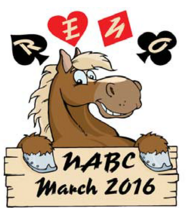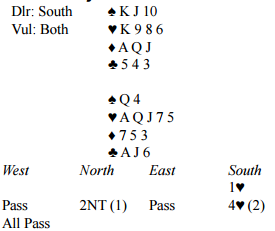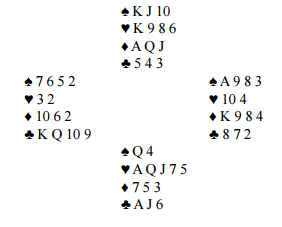 Reno, NV 2016 Spring NABC
Reno, NV 2016 Spring NABC
Mar 10, 2016 – Mar 20, 2016 



The 2016 Spring NABC is being played in Reno let us look some interesting deals from the bulletin’s series: What can go wrong? by Eddie Kantar.

(1) Game-forcing heart raise
(2) No slam interest; in theory denies a singleton
Opening lead: ![]() K
K
You are playing in a team game (IMPs). On West’s opening lead, East plays the ![]() 2, attitude, and you correctly play low, hoping West continues the suit.
2, attitude, and you correctly play low, hoping West continues the suit.
No luck. West has played this game before and knows you have the ![]() A J. At trick two, he shifts to a low diamond. What is your play? Would it be different if you were playing in a pairs game? Hearts are 2-2.
A J. At trick two, he shifts to a low diamond. What is your play? Would it be different if you were playing in a pairs game? Hearts are 2-2.
First of all, at IMP scoring, making your contract is your first priority and you can insure this one by rising with the ![]() A, removing trumps and driving out the
A, removing trumps and driving out the ![]() A. Say East wins and, too late, leads a club. Win the ace, discard the
A. Say East wins and, too late, leads a club. Win the ace, discard the ![]() J on a third-round spade winner, and concede a diamond to the king. Making four.
J on a third-round spade winner, and concede a diamond to the king. Making four.
At matchpoints, if you are willing to risk your contract for an overtrick by taking the diamond finesse, go for it. However, you must consider whether the average West player would lead a diamond from the king looking at those diamonds in dummy. Probably not. Bottom line: If West is an expert and you need a big score, take the finesse. If West is not an expert, take the money and run. Go up with the ![]() A.
A.
If you are West, it is safer to switch to a diamond at trick two than a spade even if you have the ![]() K! As far as diamonds go, declarer can always take the finesse, so you aren’t risking anything. But spades is a different story. In spades you can’t see the queen. It is dangerous to lead a suit when dummy has the A-J-10-(x) or K-J- 10-(x). If partner has the queen and declarer the missing king or ace, your partner’s queen is now history, but you have made a friend of declarer for life
K! As far as diamonds go, declarer can always take the finesse, so you aren’t risking anything. But spades is a different story. In spades you can’t see the queen. It is dangerous to lead a suit when dummy has the A-J-10-(x) or K-J- 10-(x). If partner has the queen and declarer the missing king or ace, your partner’s queen is now history, but you have made a friend of declarer for life
The hand:



